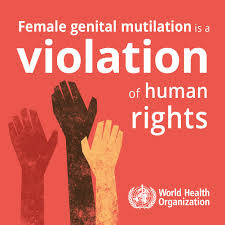By Abdulai Kamara
In August 2025, tragedy struck a small village on the outskirts of Makeni when three young girls lost their lives after undergoing Female Genital Mutilation (FGM) as part of their Bondo society initiation. The victims—12-year-old Adamsay Sesay, 13-year-old Salamatu Jalloh, and 17-year-old Kadiatu Bangura—were buried quietly by grieving families, but their deaths have reignited one of Sierra Leone’s most painful debates.
According to local sources in the Rogboreh community near Makeni, the girls were taken into a secluded bush where the initiation ceremony was performed. Villagers reported that the procedures were carried out by traditional soweis without medical supervision. Postmortem reports later confirmed excessive bleeding as the cause of their death.
Despite the sorrow, community silence was noticeable. Fear of stigma, cultural allegiance to the Bondo secret society, and pressure from elders prevented relatives from speaking openly. One family member, who asked not to be named, said: “We know our children are gone, but in this village you cannot openly challenge Bondo. It is our tradition, even if it kills.”
The Government of Sierra Leone has long been under pressure to act decisively against FGM, a practice that affects nearly 90% of women and girls in the country. Although officials have acknowledged the health risks, successive administrations have avoided a nationwide ban, often citing cultural sensitivity and political risk.
The Ministry of Gender and Children’s Affairs expressed “regret” over the reported deaths but stopped short of condemning the practice outright. Critics say this response reflects the government’s reluctance to confront powerful traditional structures tied to FGM.
Human rights activists argue that the deaths in Makeni expose the urgent need for a stronger legal framework. “Three children have paid the ultimate price for inaction,” said Mariatu Koroma, a local women’s rights advocate. “We cannot keep hiding behind culture when young lives are being lost. The government must ban FGM and provide alternatives for rites of passage.”
The Bondo society, a powerful traditional women’s group, defends FGM as a sacred initiation that prepares girls for womanhood. Supporters argue that it is a matter of cultural identity. However, health experts counter that the practice has no medical benefits and carries severe risks, including hemorrhage, infection, infertility, and even death—as seen in this latest tragedy.
Dr. Ibrahim Conteh, a gynecologist at Makeni Regional Hospital, emphasized: “These were preventable deaths. No culture should justify exposing girls to fatal harm. The state has a duty to protect children.”
Civil society groups are now calling for Sierra Leone to follow the example of neighboring countries like Liberia, which recently took steps to restrict FGM practices. International organizations, including the United Nations and Amnesty International, have also urged the government to act.
Meanwhile, families in Rogboreh remain in mourning. The three graves stand as silent testimony to a tradition that has claimed too many young lives. Critics say unless decisive action is taken, the cycle of secrecy, silence, and suffering will continue.
“We should not wait for more children to die before acting,” said one activist in Makeni. “Every death is a reminder that FGM is not culture—it is violence.”



